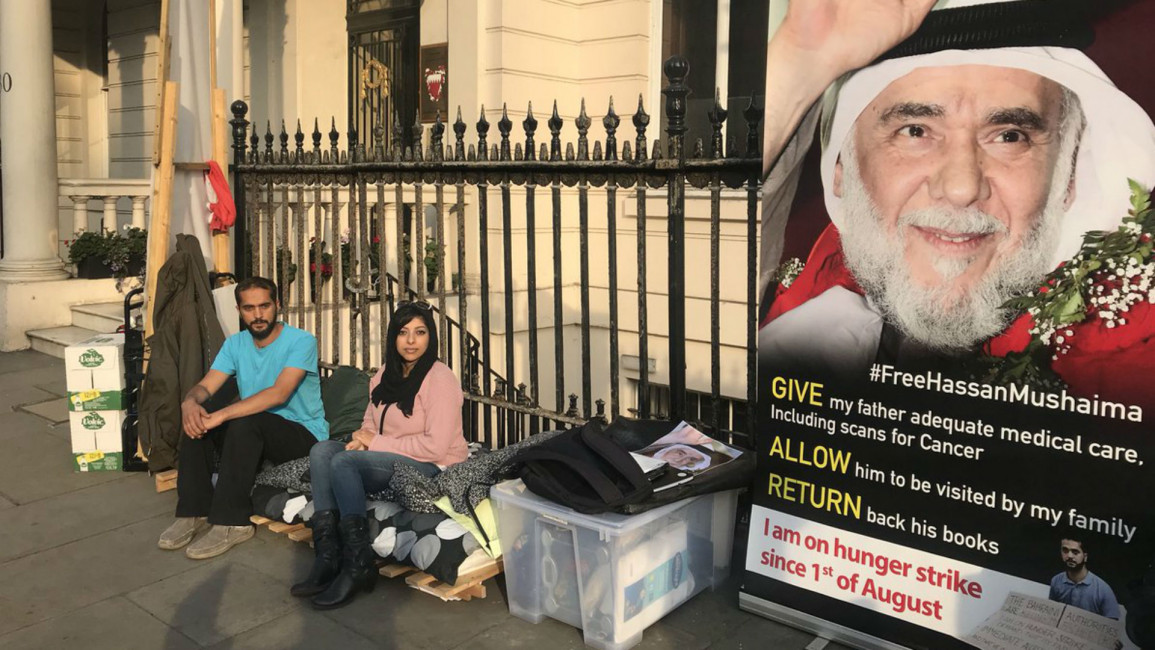Prominent Bahraini activist Zainab Khawaja joins hunger strike in London
A prominent Bahraini human rights activist, who served time imprisoned in the Gulf kingdom, has joined a hunger strike outside her country's embassy in London demanding medical aid and better treatment for prisoners in Bahrain.
Zainab Khawaja, who was forced into exile for her role in anti-government protests in Bahrain, announced she would be launching a hunger strike in solidarity with Ali Mushaima, a Bahraini activist on his 36th day of a hunger strike that saw him briefly hospitalised earlier this week.
Ali Mushaima, who has camped outside the Bahraini embassy in London since August 1 demanding medical aid for his dying father, said his protest was a "last resort", after failed attempts to raise the issue with local and international institutes.
“Today I start a silent hunger strike in support of Ali Mushaima in his fight for his father, who represents the thousands of political prisoners suffering in Bahraini prisons," Khawaja said in a statement announcing the move.
"Hassan Mushaima, who used to be an English teacher, is now a 70 year old cancer survivor, a torture survivor and political prisoner," she said, describing him as one of the most beloved leaders of the pro-democracy movement in Bahrain.
"He has been in prison for the past seven and a half years for demanding freedom and democracy for the people of Bahrain. Ali has followed in his father’s’ footsteps and is a very well-known activist who has been heroically fighting for the rights of Bahrainis for more than a decade," she said.
In an interview with The New Arab at the start of his hunger strike, Ali Mushaima said he had attempted to write to MPs and contacted different human rights organisations but was left disappointed.
"I decided to raise my father's case and show the world how the Bahraini government treats its people. I'm tired but I am strong, my heart is strong and my mind is strong. I will continue until my father gets his basic rights."
Ali's father, Hassan Mushaima, is a leading figure of the political opposition in Bahrain and is among hundreds of prisoners of conscience imprisoned by authorities for his involvement in the 2011 Arab Spring protests, calling for human rights and democratic reforms.
The 70-year-old, described as a prisoner of conscience by leading human rights organisations, has been subjected to "cruel, inhuman and degrading treatment", Amnesty International said.
The human rights group also accused the authorities of putting lives at risk.
"My father needs a scan every six months because he has a form of cancer called lymphoma," Ali said, noting the screening was in September 2016.
"My father is dying slowly, they're killing my father slowly. I wouldn't sleep on the street and leave my wife and children for nothing, this is real," he added
Hassan Mshaima needs about ten different medications for erratic blood pressure, diabetes, urinary-tract irritation and gout. He is now completely out of medicine for his diabetes, and must receive insulin shots in his cell.
The prison administration is not providing these on a regular basis and is refusing to replenish supplies of his other medication.
Hassan Mushaima was sentenced to life imprisonment in 2011 - after what campaigners said was an unfair trial - for leading peaceful anti-government protests on the island.
In the same case, nine other opposition activists received sentences ranging from five years to life imprisonment. Two of them have since been released.
Forced exile
Zainab Khawaja, who has now joined Mushaima’s protest, left Bahrain after being jailed for three years and one month on charges related to her participation in the anti-government protests, including tearing up the monarch's picture and insulting a police officer, the Gulf Centre for Human Rights said.
She was in prison with her 17-months-old son prior to her release on "humanitarian grounds," according to the Bahraini authorities.
She was arrested 12 times for her involvement in the demonstrations.
She is the daughter of well-known activist Abdulhadi al-Khawaja, who himself is serving a life sentence over his role in the protests that saw the island's Shia majority and others demand more political freedom from its rulers.
Bahrain, a Shia-majority country located between regional rivals Saudi Arabia and Iran, has been ruled for more than two centuries by the al-Khalifa dynasty.
Authorities have jailed dozens of high-profile activists and disbanded both religious and secular opposition groups since protests demanding political change erupted in 2011.
Since then, the island has faced low-level unrest, protests and mass arrests of prominent opposition figures and human-rights activists, some of which have been stripped of their nationality and forced into exile, while others remain imprisoned in harsh conditions.



